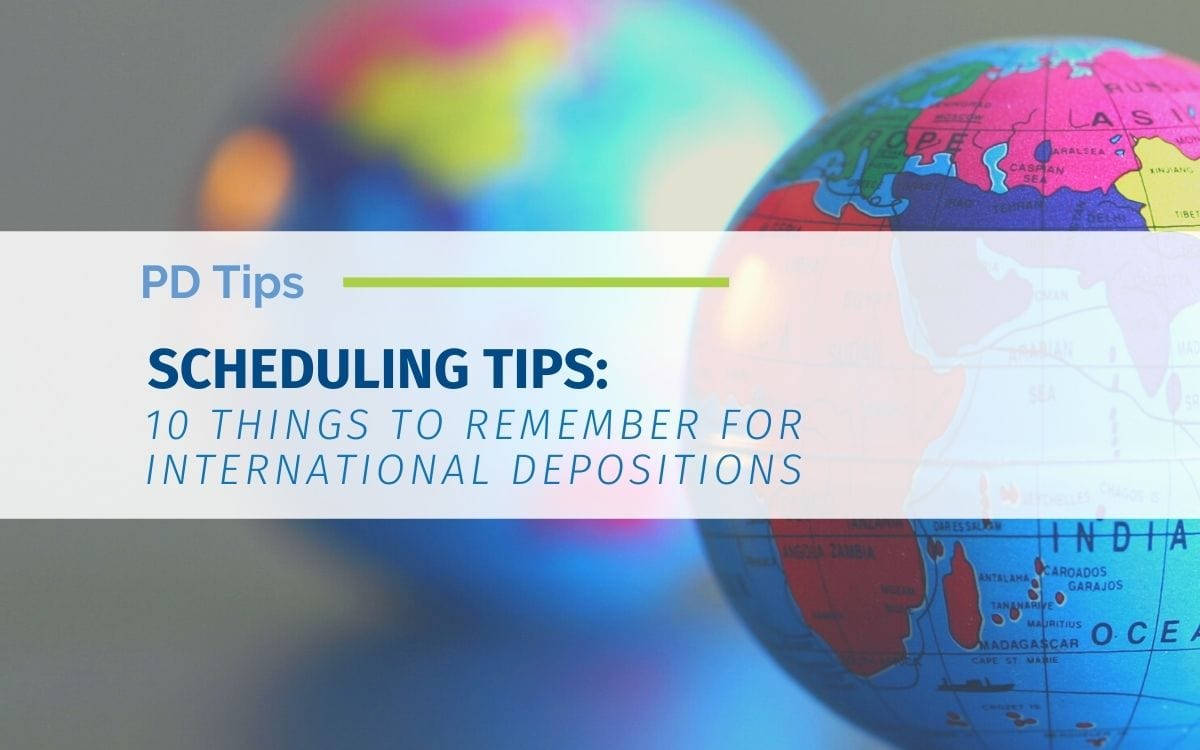Go ‘Realtime’ – Foreign Depositions
By Jodi Harmon, CRR, RMR
Litigation involving foreign witnesses can be challenging. Paralegals will no doubt find that their cases will require the services of both deposition interpreters, also known as legal interpreters, and realtime court reporters who are up to the task.
In virtually any foreign venue, it is not difficult to find general interpreters (those who translate verbally) who are useful for meetings and conferences – and for acting as tour guides. Likewise, translators (those who work with the written word and translate documents) are easy to find. Do not fall into the mistake, however, of believing that a general interpreter or translator can work effectively as a deposition interpreter without having additional skills.
Hiring a qualified deposition interpreter outside the United States has unique challenges that are not usually encountered on home shores. This is particularly because most countries simply do not have a discovery or deposition process. Very few foreign interpreters have the requisite experience you expect. Furthermore, opposing counsel often hires a “check interpreter” whose job is to correct the main interpreter. This process can easily intimidate interpreters who are not familiar with the use of check interpreters.
Retaining an interpreter with little or no deposition experience at a “bargain” price can ultimately cost more because of constant disruptions and corrections from the check interpreter. Depositions could be prolonged for hours and allow less time for actual witness testimony. Using even the most skilled interpreters will approximately double the time it takes to conduct a non-interpreted deposition.
Due Diligence
The following questions should be asked of prospective interpreters to get the most out of foreign depositions in the shortest time.
- Are they familiar with the protocol for taking American depositions?
- How much experience do they have with specifically interpreting depositions that involve the subject matter of the case?
- Have they previously interpreted in the specific city or country to the extent that they are familiar with the nuances in local dialect or accents, protocol, geography and terminology?
- What are their qualifications? For example, Asian interpreters label themselves “People’s Republic of China Certified” or “Taiwan Certified,” etc., even though there are no such certifications.
- Do they understand that their role is as an officer of the court and that they need to maintain neutrality and accuracy without addition, embellishment, or omission?
- Do they understand that they should interpret in first person? If the witness says, “my name is Yutaka Takahashi,” then the interpreter should say exactly that, not, “he says his name is Yutaka Takahashi.”
- Have they worked with check interpreters before? Do they understand that their interpretation may be challenged and that they need to conduct themselves professionally without becoming defensive and wasting the time of the examining attorney?
- Are they familiar with local customs, restaurants, hotels, and support services so they can assist the legal team with such matters if necessary?
The ‘Realtime’ Option
Realtime court reporters are a tremendous aid during interpreted depositions. The ability of the attorneys and interpreters to view the testimony in realtime that contains foreign proper names and terminology, particularly during technical testimony, can enhance comprehension and save time by reducing the need for making extensive notes.
Although the U.S. has the largest supply of realtime reporters, there are English language realtimers in several countries. The following questions will ensure that a realtime reporter, whether domestic or foreign, is up to the challenge of covering a foreign deposition.
- Are they Certified Realtime Reporters (by the National Court Reporters Association) from the United States?
- Do they follow the U.S. Federal Rules of Civil Procedure guidelines for transcript formats?
- Will they use American or British spellings (e.g., “analyze” vs. “analyse,” “defense” vs. “defence,” “check” vs. “cheque,” etc.)
- Can they do realtime technical testimony that includes foreign names and geographical terms with at least 99.5 percent accuracy?
- Are you speaking with the actual reporter who will cover the deposition, or will there be a subcontracted reporter? You should insist upon speaking to the actual reporter.
- Are they sure their equipment will arrive intact and on time, surviving the ordeals of increased airport security, customs, and weight restrictions?
- Do they have a backup plan if any of their audio or video equipment malfunctions?
- Are they bringing multiple realtime laptops to the deposition for attorneys who may have connection problems with their own laptops?
- Will they provide a realtime laptop to the interpreter?
Deposition interpreters and realtime reporters work together like a well-oiled machine to facilitate the most effective deposition possible. When a question must be repeated, the interpreter can do so from the screen without the lawyer having to repeat the question. Interpreters and court reporters who frequently work together often develop their own styles. For example, an interpreter may hold up notes with foreign spellings as the words are spoken so that the reporter can write all words accurately from the outset.
Anticipate
To provide superior interpreting and realtime performance, the team should be given as much reference material as possible at least a week before the deposition. This includes copies of the complaint, prior transcripts from the case, a word index from prior depositions, patent numbers if it is an intellectual property case, and exhibits.
Counsel should stipulate before the deposition begins whether objections are to be interpreted for the witness. The importance of speaking one at a time during an interpreted deposition should be emphasized.
Keep in mind that court reporters write up to 260 words per minute, and interpreters are speaking at least twice as much as the reporter is writing. The work of interpreters and reporters is very difficult, so a short break every hour or so is essential to keep them sharp.
Read More From Planet Depos

How to Renew your Passport
International travel is taking off! International depositions are scheduling, so renew your passport with these step-by-step instructions.
Read Now View Full Post
12 Tips to Make You Better at International Travel During A Pandemic
International travel can be tricky, especially when you’re on the job. Here are 12 quick tips that will help you be better at international travel.
Read Now View Full Post
10 Important Tips for Scheduling an International Deposition
The process of scheduling an international deposition can have several moving pieces, here are some of our best tips to remember when scheduling.
Read Now View Full Post
How To Take A Deposition in Modugno, Italy
Although global travel has essentially been put on hold due to the COVID-19 pandemic, you can still plan ahead for your next deposition abroad.
Read Now View Full PostSchedule a Proceeding Today!
Your remote mediation should be simple, and with Planet Depos yours will be. Schedule today and we’ll get you set up with a Zoom room, a PD Technician, and everything you need to get started.
Schedule now